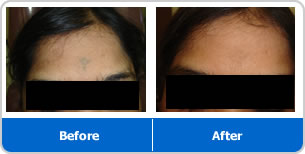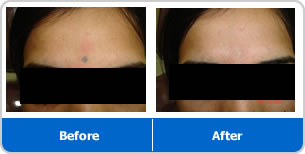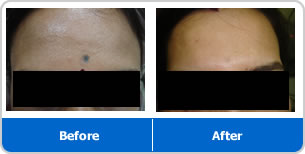
Services > Tattoo Removal
Tattoo Removal



Can All Tattoos Be Removed?
Unfortunately, not all tattoos can be removed completely, but the majority can be permanently removed. Tattoos are meant to be permanent and with recent ink technology and professional tattoo artists improving their skills, tattoos imprinted on in the last decade are very difficult to remove. Even with the best technique, some residual scarring remains in a few cases.
How do lasers remove tattoos?
Lasers work by directing their action on the ink with highly concentrated ray of colored light beams. These laser beam breaks up the ink particles into tiny fragments which are later cleared up by the body’s scavenging cells. This process of fragmenting the ink particles requires numerous sessions depending on the depth of the ink level. The procedure is bloodless and no incisions are made. The laser selectively targets the pigment of the tattoo without damaging the surrounding skin. One has to understand that with deeper penetration of the skin and multiple sessions, the heat generated by the lasers also cause pain and blister formation. Even though laser technology is refined, the chance of scarring is always present with multiple treatments.
Who is a Candidate for laser tattoo removal?
Those individuals with fair skin and superficially placed tattoos on the arms, chest, buttocks or legs are the best candidates. Tattoos placed in dark skinned people who have tattoos placed on the ankles or fingers are the most difficult to treat and results are not as good.
What determines the success of tattoo removal?
Complete removal of a tattoo is based on several things. This is based on the size, location, the individual's ability to heal, how the tattoo was applied and how long it has been in place. Newer tattoos are generally more difficult to remove than old ones.
Does Tattoo Removal Hurt?
Unfortunately tattoos are painful when they are placed on the skin and they are just as painful when they are removed. The laser’s pulse generates rapid pulses which feel like a needle sting. To minimize the pain, the physician will recommend taking Tylenol a few hours before the procedure. Aspirin like products are not recommended because they have a tendency to increase the bruising. To further decrease the pain, the physician may apply a local anesthetic ointment on the tattoo a few hours before the procedure. In some cases, the physician may inject a local anesthetic into the tattoo before the procedure.
How long does each procedure take?
Laser treatment usually does not take more than a few minutes. However, multiple sessions are required to remove most tattoos. The multiple sessions are split over 4-8 weeks, depending on the size and complexity of the tattoo
What happens at the physician’s office?
Once the individual arrives at the clinic, the protective eye shields are placed to protect from the harmful laser rays. The skin’s reaction to the laser is tested to determine the most effective energy. This is followed by the physician taking a small “pen like probe” and activates it against the tattoo. Each fire of the laser feels like a needle sting. Depending on the size of the tattoo, 10-30 pulses of the laser may be required in one session.
What happens after each treatment?
After each laser treatment, ice is immediately placed on the tattoo to minimize the swelling. After about 30 minutes, a topical antibiotic ointment is placed on the tattoo followed by a sterile dressing. The skin site should be left dry for a few days. It should be treated just like a sunburn.
Does the procedure have any side effects?
Side effects of laser procedures are generally few but may include hyperpigmentation (excessive color), or hypopigmentation (excessive fading) of skin. Other possible side effects include infection and a small chance of permanent scarring. The area may appear like a sun burn for a few months and ultimately the skin will become normal.
What is the cost for tattoo removal with laser?
Tattoo removal is big cosmetic business and as such is not covered by any medical insurance plans. Tattoo removal is much more expensive than tattoo placement. Laser tattoo removal can range from several hundred dollars up into the thousands of dollars, depending upon the size, type and location of the tattoo and the number of visits required.
How many laser sessions are required?
Most simple tattoos are removed in 2 - 4 treatments scheduled about 4-8 weeks apart. Removing complex and deep tattoos requires a series of treatments spaced approximately 8 weeks apart or longer. Professional tattoos usually require 6-10 treatments for complete clearing. A large, professional tattoo in color can cost thousands of dollars to remove, and the success of the procedure still can not be guaranteed.
Other Medical Methods
There are other methods of tattoo removal, but most of them are painful and ineffective. Today laser therapy has replaced most of them. The other methods include dermabrasion, camouflage and excision of the tattoo. These methods cause a lot more damage to the skin and also result in scarring. These techniques are only used when laser is not an option.
Cream Removals
The best advice on cream removers is they do not work. There are 100s of chemicals for sale claiming their effectiveness at removing tattoos. The only thing they remove is your finances. Avoid them and go and see a physician. It will save you a lot more money in the long run.
Does Insurance Cover Laser Tattoo Removal?
Since tattoo removal is a personal option in most cases and is considered a cosmetic procedure, most insurance carriers will not cover the process unless it is medically necessary. Physicians or surgery centers practicing tattoo removal may also require payment in full on the day of the procedure. If you are considering tattoo removal, be sure to discuss associated costs up front with the physician, and obtain all charges in writing before you undergo any treatment.
Final Advice
Because laser surgery is a medical procedure inherent with all the possible complications and costly, it is recommended that one go and see a professional physician who is experienced and understands the procedure. Avoid going to back street tattoo removal parlors because tattoo removal is a complex procedure which is best done by professionals. Find a reputable dermatologist or cosmetic surgery center to ensure proper treatment and care. If possible, you should obtain a recommendation from your family physician for a physician who specializes in tattoo removal.
Laser Tattoo Removal Related News & Articles
Laser tattoo removal may sound like science fiction, but it has been performed for years. The different types of lasers used are all very similar in construction and function, but different crystals are used in each type. The most common types of lasers used for tattoo removal are:
-
Q-Switched Ruby Laser:
This was the first laser used for tattoo removal. The light wavelength of 694nm makes this useful for green tattoos (the most difficult to remove). Although special care must be taken when treating someone with dark skin, this laser is still very useful for removal. -
Q-Switched Nd:
YAG Laser. Introduced in 1991, the neodymium: yttrium-aluminum-garnet laser became the most heavily-used laser in the tattoo removal industry. This laser can operate alone at a wavelength of 1064nm (effective for removal of dark blue or black ink) or with a frequency-doubling crystal to shorten the wavelength to 532nm (effective for removal of red or orange ink). -
Q-switched Alexandrite Laser:
This laser, introduced in 1992, operates at a wavelength of 755nm, which resides between those of the ruby and neodymium: YAG lasers. It is excellent for the removal of green and blue-black tattoos.
All of these lasers are highly useful for tattoo removal, but as you can see, certain lasers more effectively remove certain colors. You should consider finding a clinic that uses all three lasers (as many do), because this will greatly increase your chances of effectively having your tattoos removed.
What options are available for tattoo removal?
Thousands of individuals each year undergo placement of permanent tattoos somewhere on their bodies. After the initial excitement, a significant number realize that they have made a bad choice and want the tattoo removed. Tattoo removal has now become a million dollar business and the art of tattoo removal has now moved into the arena of the plastic and cosmetic surgeons. Over the decades, a number of techniques have been developed to remove tattoos. Many of the older techniques are mentioned only to be placed in the archives of tattooing history.
What are the techniques of removing tattoos?
Methods for removing tattoos include laser treatments, abrasion, scarification, and surgery. Of all the techniques, Laser removal of tattoos is the gold standard
What does laser treatment consist of?
Laser treatments can remove most tattoos, some more easily and than others. Generally, several visits are necessary over a period of weeks to month and the treatments are expensive. Some individuals experience hypopigmentation -- a lightening of the natural skin coloring -- in the affected area. There also have been reports of individuals suffering allergic reactions after laser treatments to remove tattoos, apparently related to the ink released from the tattoo. In addition, laser treatments are expensive ranging from several hundred to several thousand dollars
What is dermabrasion?
Dermabrasion involves abrading (rubbing/scratching) the skin with a wire brush or diamond fraise (a type of sanding disc). Dermabrasion is used frequently by the dermatologist for evening out deep pitted acne scars and fine lines around the mouth and eyes due to aging. The procedure is slightly painful and requires multiple treatments spaced over a few months. Dermabrasion works much like a chemical peel in that it removes the top few layers of skin. This process itself may leave a scar. The technique is rarely used today for tattoo removal.
What is Salabraison?
Salabrasion is a technique whereby the tattoo is soaked in a salt solution to remove the pigment. It may be combined with dermabrasion. The technique is only effective for superficial tattoos and requires multiple treatments. At best, this technique only causes fading of the tattoo.
What is Scarification?
Scarification Involves removal of the tattoo with an acid solution. Chemical peels have been around in various forms for over half a century. In the past 2 decades, 25% trichloro acetic acid is available as a chemical peel. The TCA skin peel causes a controlled burn which results in several layers being peeled off and fresh, new skin being revealed. The technique is rarely used today.
Is surgery ever required to remove tattoos?
Surgical removal involves excising the entire tattoo together with the skin. The skin is then sutured back if the defect is small; otherwise skin grafts are required to close the defect. Surgery is a last resort for very large tattoos and only done when all other measures have failed.
What is camouflage?
Camouflaging a tattoo entails the injection of new pigments either to form a new pattern or cover a tattoo with skin-toned pigments. Injected pigments tend not to look natural because they lack the skin's natural translucence. The price is usually just the price of a regular tattoo, and when done correctly your old tattoo will be completely invisible.
What is Intense Pulsed Light ?
Intense Pulsed Light skin treatment has been used to treat acne and can also causes tattoo fading. IPL works better on bright colors and is quite effective in fading a tattoo. The treatment is effective but also expensive. Multiple treatments are usually required.
What is TCA?
TCA has been medically tested and proven to fade/lighten and/or remove tattoos. It is a common skin peeling agent used by dermatologists, cosmeticians and plastic surgeons to help remove fine lines, wrinkles and acne scars. More on TCA...
Final Advice
BEWARE OF OLDER TECHNIQUES and if not in a hurry, save some money and get laser therapy to remove the tattoo. Of all possible removal techniques, laser removal is considered the safest and least painful. Lasers therapy can the pigment, land causes minimal scarring. Different types and wavelengths target different colors, breaking up the pigment and leaving the body's natural healing mechanisms to remove the ink.

